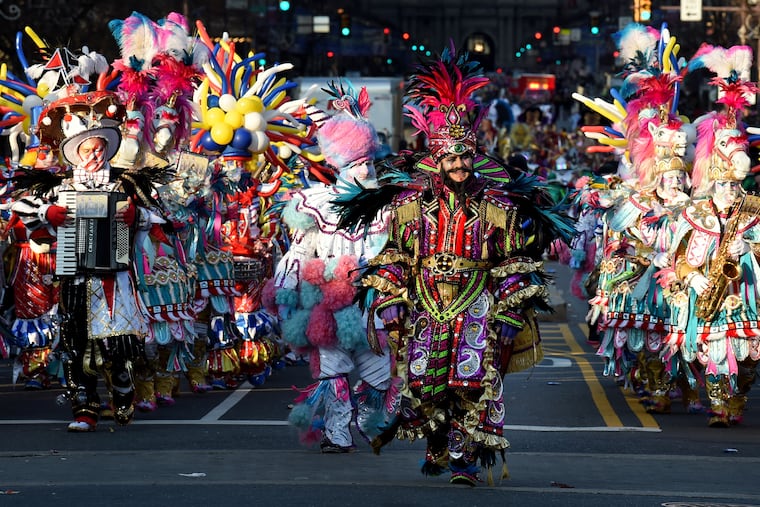It’s not ‘unconstitutional’ to cancel a parade — or to call out racist cops | Editorial
Canceling the Mummers Parade and the Broad Street Run does not impede free speech.

William M. McSwain, the U.S. attorney for the Eastern District of Pennsylvania, is accusing Mayor Jim Kenney’s administration of ”unconstitutional” behavior. Separately, so are lawyers for some of the current and former Philly cops disciplined, forced to retire, or fired last year for their racist, homophobic, and otherwise deeply offensive social media posts.
This also follows the case of the Bellmawr, N.J., gym which also last week claimed Gov. Phil Murphy’s directives on business operations during the pandemic are trampling on their constitutional rights.
Among these claims, the more spectacular allegation: that cops whose messages or posts on Facebook included references to Black people as “monkeys” were victims of discrimination for privately expressing personal views protected by the First Amendment.
Anyone familiar with Facebook knows that little on this platform is “private” in any real sense. So it’s ridiculous to argue that racist Philly cops seeking to share their appalling opinions with a few like-minded pals were penalized for being politically “incorrect” when their posts were exposed by the Plainview Project. Also ridiculous: that the lawsuits filed this month collectively demand $108 million in damages.
Genuinely private expressions of noxious views of all sorts may be protected in some circumstances. But there’s no such thing as a constitutional right to be a Philly cop, let alone one who brandishes racial slurs online so that pretty much anyone with access to a computer can read them. The city has every right to limit certain sorts of speech or public expression by its employees — especially when at stake is viable working relationships between police officers and the community they serve.
» READ MORE: Canceling big parades but allowing protests is ‘unconstitutional,’ U.S. Attorney McSwain tells Kenney
Similarly, and despite McSwain’s assertions to the contrary, the city is not discriminating against certain points of view by canceling scheduled events such as the Mummers Parade and the Broad Street Run. Kenney cited concerns about the potential spread of the coronavirus in large crowds; the events attract tens of thousands but can be rescheduled or resume in the future. McSwain claims that canceling these big events while allowing spontaneous and smaller public demonstrations to occur means the city is judging certain viewpoints as more worthy of protection than others.
That’s not what the city is doing. Prohibiting large public gatherings while enabling smaller, spontaneous protests to take place is an effort to protect protest, period. McSwain should know that, but he’s never been afraid of getting attention — as witnessed by the publicly funded campaign to slap his face and name on billboards and elsewhere statewide.
» READ MORE: U.S. Attorney Bill McSwain spent more than $75,000 to slap his name and face on billboards
Meanwhile, McSwain’s patron, Donald Trump, is orchestrating an extraordinary deployment of special federal troops into cities such as Portland, Ore., and Chicago, and has identified Philadelphia as a potential target of this “peacekeeping” campaign. Most of the cities so targeted have progressive Democratic mayors opposed to the president.
Perhaps that explains why the U.S. attorney seems unfazed by the legitimate concerns in Philly and across the country about the militarized deployments into American cities. Unlike McSwain’s allegations about Philly’s events ban, “Trump troops” raise constitutional issues that actually should be taken seriously.
Correction: This editorial was modified to clarify an assertion that parades such as the Mummers Parade are not protected by the Constitutional right to free speech, but civil protests are. The Supreme Court has made a number of rulings granting rights to parades as a form of expression.